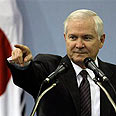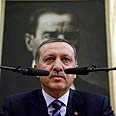

Drop in Iran oil production even before fresh sanctions
Former Iranian government official tells Financial Times oil production capacity dropped by about 300,000-400,000 bpd due to sanctions, decision by major oil companies to cut ties. Gates: UN draft resolution on new sanctions stronger than anticipated
WASHINGTON – US Defense Secretary Robert Gates said recently that the draft UN Security Council resolution on sanctions against Iran is stronger than he expected, but it appears as though the US' efforts to curb Tehran's nuclear ambitions have already yielded results in the form of a sharp drop in Iran's oil production and a subsequent loss of billions of dollars.
"Oil production capacity has dropped by probably about 300,000-400,000 bpd," a former senior official in Iran's government told the Financial Times.
The drop in Iran's oil production is primarily the result of a decision by some of the world's largest oil companies to sever economic ties with the Islamic Republic due to US pressure and the impending sanctions.
According to the Financial Times, the reduction in oil production also stems from personnel changes in Iran's oil industry.
Oil Minister Massoud Mir-Kazemi has told parliament that Iran must invest at least $25 billion every year in the energy sector or risk becoming a net importer of oil. Sanctions imposed because of the country’s nuclear ambitions have discouraged foreign investment and made it harder for Iran to obtain western oil technology, according to the Financial Times report, published Monday.
Meanwhile, US Defense Secretary Gates said the UN draft resolution serves as a reminder of Iran's international isolation and that all the major powers oppose its nuclear weapons ambitions. But he said the resolution will also have a practical impact.
"The resolution provides a new legal platform that allows individual countries and organizations, such as the EU, to take significantly more stringent actions on their own, that go way beyond, well beyond, what the UN resolution calls for in and of itself," the American defense secretary said.
"By itself, we've seen other resolutions before that have, obviously, not changed their behavior. But as we go along in this process, I think that the ratcheting up of what other countries are willing to do on their own, using the resolution as a basis, does have the potential to change behavior," Gates added.
Apart from promoting new sanctions against Iran, Washington is also working to thwart Turkey and Brazil's attempt to advance a compromise on Iran's nuclear program. Senior Obama Administration officials reported of tensions in relations with Ankara.
Last week, President Barack Obama told Turkish Prime Minister Recep Tayyip Erdogan that the international community shared "continuing and fundamental concerns about Iran's overall nuclear program, as well as Iran's failure to live up to its international obligations."
He said the atomic fuel deal reached with outside mediation by Turkey and Brazil failed to allay concerns that Iran is ultimately intending to develop a nuclear weapons capability.















